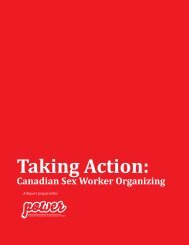THE BASICS: DECRIMINALIZATION OF SEX WORK 101 - Stella
THE BASICS: DECRIMINALIZATION OF SEX WORK 101 - Stella
THE BASICS: DECRIMINALIZATION OF SEX WORK 101 - Stella
- No tags were found...
Create successful ePaper yourself
Turn your PDF publications into a flip-book with our unique Google optimized e-Paper software.
01<strong>THE</strong> <strong>BASICS</strong>: <strong>DECRIMINALIZATION</strong> <strong>OF</strong> <strong>SEX</strong> <strong>WORK</strong> <strong>101</strong>1. Intro 2. Why Prostitution Law Reform? 3. What is the Decriminalization of Sex Work? 4. How Does DecriminalizationHappen? 5. Sex Workers and Decriminalization Through the Courts 6. How to Support Sex Workers in Law Reform?This InfoSheet is part of a series of 5 producedby <strong>Stella</strong> in collaboration with allies toeducate and mobilize communities aroundlegal advocacy and decriminalization of sex work.1. The Basics: Decriminalization of Sex Work <strong>101</strong>2. Sex Work and the Charter3. Challenging Prostitution Laws: Bedford v. Canada4. Language Matters: Talking About Sex Work5.10 Ways to Be a Great Ally to Sex Workers1INTRODUCTIONThe Canadian sex worker rights movement has called for the decriminalizationof sex work for more than 30 years.Decriminalization is part of our larger struggle for the recognition and actualizationof sex workers’ rights - including the right to autonomy, equality, self-determinationand dignity. We recognize that some laws contribute and reinforceinequality, disadvantage and discrimination based on class, race, gender,citizenship status, mobility, mental health and other ways that people are situated.Decriminalization alone cannot overcome all of the other injustices thatmany of us face, but it is a necessary step to protecting and respecting sexworkers’ rights.2WHY PROSTITUTION LAW REFORM?Sex workers across the globe struggle to workin health and security and without the threatof arrest or imprisonment. Canada’s prostitutionlaws contribute to the violence anddiscrimination that sex workers experience inour lives and our work. While prostitution islegal, virtually every activity surrounding it isnot. The Criminal Code of Canada prohibitscommunicating for the purposes of prostitutionin public (s. 213 “communicating”), theuse of indoor workspaces (s. 210 “bawdyhouses”),the transportation to a workingspace (s. 211) and managerial and/or collectiveactivities (s. 212 “procuring”). Theselaws prevent us from taking meaningful stepstowards working safely.Prostitution laws threaten almost all sex workersin every sector of the indoor and outdoorsex industry.Criminalizing sex work means the steps weneed to take for fair and safe working conditions,and to communicate and negotiatewith our clients and the people we work with,are illegal. The communicating law impactson all sex workers’ ability to negotiate clearlywith clients. Sex workers, predominantly sexworkers working on the street, are continuouslytrying to avoid arrest and incarceration.We are constantly displaced into moreisolated areas and prevented from workingin proximity to each other.Criminalizing our clients means that clientsare also displaced and less visible as theyavoid arrest and incarceration. This makesit more difficult for us to meet with clients incontexts were we can effectively screen themand where we can properly negotiate services.As a consequence, sex workers acceptclients who we would otherwise turn away —including those that pose as clients but maybe targeting us for violence knowing that weare at risk of criminalization, as well as thoseclients who insist on unsafe sex practices.Criminalizing third parties means the peoplewe hire, work for or work with to book ourclients, offer us protection, drive us to work orprovide a working space are at risk of beingarrested. It also means that sex workers don’thave recourse if we encounter third partieswith discriminatory or abusive work practices.Criminalizing third parties who are ourpartners and the people we live and workwith also increases our isolation.These laws contribute to the high levels ofviolence in our communities: it means we liveand work in isolation, we cannot access legaland social protections (such as police, employment and human rights protections), andwe experience grave human rights abuses,such as physical assault, sexual assault, domesticviolence, coercion, confinement andtheft. It is the most marginalized sex workerswho bear the brunt of violence, police brutalityand constant arrest and criminalization.High levels of violence are also a result of thevulnerability that is created when sex workersare labeled as criminals and not able toaccess police protection without risk of jailtime. The stigma of being a criminal, alongwith the stigma around sex work, increasesour risks from people who pose as clients –these people target sex workers for violencebecause they know we do not have protectionof the police and other authorities whenwe are victims of violence.These realities need to be visible and recognizedin order to reform prostitution laws.These same realities, however, prevent mostsex workers from being visible because ofthe real risks of arrest and incarceration,discrimination, rejection from family, losingcustody of children, eviction, being firedfrom employment, being deported and otherconsequences related to the criminality andstigma associated with sex work.Published in April 20131
3WHAT IS <strong>THE</strong> <strong>DECRIMINALIZATION</strong> <strong>OF</strong> <strong>SEX</strong> <strong>WORK</strong>?As part of a movement to recognize our autonomy, self-determinationand need for better working conditions, sex workersaround the world demand the removal of laws and policies thatmake sex work a crime. In countries where there are criminallaws, like Canada, we call for the total decriminalization of sexwork.At its core, decriminalization means the removal of all criminallaws that prohibit selling, buying or facilitating (procuring) sexwork.Decriminalization would reduce the stigma, discrimination anduncertainty that comes with criminality -- allowing us to live andwork in health and safety and without fear of arrest that deprivesus of our freedom and dignity.Sex workers have different needs depending on where we aresituated and how we work. What we want our industry to looklike in a non-criminalized environment will look different forsex workers across the country. Most sex workers are accustomedand skilled at working in an informal and unrecognizedeconomy for many years. Decriminalization could mean a hugeadjustment in working context for sex workers who work in theunderground, whether by choice or necessity. For example, sexworkers have developed knowledge and skills rooted in avoidingpolice and other repressive measures; we have developedways of working around precarious conditions and we have createdother forms of security where police and other mechanismsfail to protect us.Despite the adjustments that come with law reform, decriminalizationwould mean that sex workers, our clients and thirdparties (such as security, partners and receptionists), would notbe breaking criminal laws for working in the sex industry, andwould not be risking arrest.More specifically, the removal of prostitution laws would mean:· We could openly communicate and advertise our services,prices and negotiate limits and boundaries with clients;· We could work alone or with groups in indoor or outdoorspaces without fear of arrest;· We could report abusive or discriminatory hiring and workpractices and fight for access to labour protections that facilitatenegotiating or bargaining power with third parties;· We could work with, work for, or hire people to help us findand book clients, provide security, drive us to work, handleour money and work with others so we are not always isolated;and· It would also mean that our partners and people we live withwould not be at risk of criminalization.For reasons to support the decriminalization of sex work10 Reasons to Fight for the Decriminalization of Sex WorkBy Mensah, M.N. and C. Bruckert. 2011.cybersolidaires.typepad.com/files/10reasons.pdf10 Reasons to Decriminalize Sex WorkPublic Health Program, Open Society Foundations. 2012.www.opensocietyfoundations.org/publications/ten-reasons-decriminalize-sex-work4HOW DOES <strong>DECRIMINALIZATION</strong> HAPPEN?For law reform or decriminalization to happen, sex workers andallies need to engage the legal systems that take apart and rebuildlaws -- the courts or Parliament.Through ParliamentParliamentary committees are sometimes set up to have discussionsabout pressing social issues. Since 1980, Canada hashad three parliamentary reviews and researches of prostitutionlaws and their impact on sex workers: The Special Committee onPornography, otherwise known as the Prostitution Fraser Committee(1982); the Federal/Provincial/Territorial (F/T/P) WorkingGroup on Prostitution (1990); and most recently in 2003,the Subcommittee on Solicitation Law Review (SSLR). These committeesoften make recommendations for changes to prostitutionlaw.Historically, it has been valuable to engage with politicians andlawmakers around policies that negatively affect sex work communities.Through the courtsLaws are also struck down or changed by the Canadian courts –individuals or groups can try to take the government to court tochallenge the usefulness or fairness of a law. Court cases comewith a range of challenges for sex workers. They can be verylegalistic and can result in sex worker rights communities losingpower -- court cases can have limitations and may not be able toaddress all of the issues that we might address at a communitylevel or through social campaigns.Court cases also need to be brought forward by an individual.Finding an individual who can represent the diversity of sexworkers’ experiences is difficult. Also, often the people who docome forward face a lot of public scrutiny as not being representativeor not appealing to the image of sex work that peoplehave. Stigma around sex work means a constant discrediting ofsex workers who do come forward and more importantly, criminaland financial risk!A court challenge can place the focus on the fundamental problemwith prostitution laws: They deny sex workers of our rightsto safety, autonomy and equality. A court challenge allows sexworkers’ experiences to be recognized as legal evidence – wecan demonstrate how the laws actually make it more dangerousfor us to work and live. In this sense, court challenges can addressthe core problem – our human rights violations.There’s no “best way” to approach decriminalization. How weengage with Parliament and the courts, and the role that sexworkers play in framing and articulating the problems, definesthe success of any law reform initiative. That being said, thedominant values and ideologies of the court or Parliament at anygiven time will impact the results of any law reform initiative.Published in April 20132
5<strong>SEX</strong> <strong>WORK</strong>ERS AND <strong>DECRIMINALIZATION</strong> THROUGH <strong>THE</strong> COURTSSince 2007, there have been two majorinitiatives to remove criminal laws againstsex work. Both of these were in response toviolence against sex workers. It is well documentedthat over sixty sex workers have beenmurdered in Vancouver, more than sixteensex workers have gone missing in the Edmontonarea over the last twenty years and seventeensex workers were killed over the last tenyears in Quebec. This does not even addressthe violence in other provinces. The violenceexperienced by sex workers on the street isdisproportionate compared to the rates ofviolence experienced by other sex workers.More so, police departments across Canadahave failed to properly investigate these incidents,focusing instead on arresting sex workers.For us, decriminalizing all aspects of sexwork is essential to reducing this violence.Bedford v. CanadaIn 2007, Terri Jean Bedford, Amy Lebovitchand Valerie Scott initiated their case at theOntario Superior Court of Justice seeking theremoval of three prostitution laws from theCanadian Criminal Code:· s. 210 (bawdy house);· s. 212(1)(j) (living on the avails); and· s. 213(1)(c) (communicating in a publicplace for the purposes of prostitution).The arguments are relatively straightforward:It is not unlawful to work as a sex worker yetcriminal laws make it virtually impossible fora sex worker to work in a safe and secure environment.They argue that these prostitutionlaws contradict sex workers’ rights protectedby the Canadian Charter of Rights and Freedoms.Specifically, these three laws violatesex workers’ s. 7 right to liberty and securityof the person, and the communicating lawalso violates sex workers’ s. 2 right to freedomof expression.SWUAV v. CanadaIn February 2007, a group of sex workerswho work on the streets of the DowntownEastside of Vancouver, called the DowntownEastside Sex Workers United AgainstViolence (SWUAV), along with former sexworker Sheri Kiselbach, went to the SupremeCourt of British Columbia to challenge a widerange of criminal laws on prostitution.SWUAV v. Canada wanted to decriminalizeadult sex work by challenging most of theprostitution provisions in ss. 210-213 of theCanadian Criminal Code. SWUAV arguedthat, as a result of these laws, sex workersexperience systematic discrimination, exploitationand violence. They wanted to demonstratehow these laws negatively impact sexworkers’ safety, health and well being andas a result violate sex workers’ constitutionalrights to life, liberty, security and equality,and freedom of expression and association.This constitutional challenge is different to theBedford case in two distinct ways: First, in additionto sections 2(b) and 7 of the Charter, itargues that the s. 15 Charter right to equality,and the s. 2(d) freedom of association arealso violated -- arguing that sex workers as agroup are discriminated against and experienceinequality due to these laws. Second,SWUAV challenges a much wider range ofthe prostitution laws.At first the court rejected SWUAV on thegrounds that both SWUAV and Sheri Kiselbachdo not have the legal right to bring thecase forward -- SWUAV, as an organization,was not affected by prostitution laws andSheri, as a former sex worker, was not currentlyaffected by prostitution laws. In otherwords, the court said that only an individualsex worker who was currently working or arrestedcould make this Charter claim. So atthis point the nature of the case changed. Insteadof arguing for decriminalization, thesesex workers first had to argue that they hadthe right to represent their case and to beheard by the courts!SWUAV argued that a collective such astheirs, representing sex workers in the DowntownEastside, had the right to bring forwarda Charter challenge. SWUAV was created toprotect individual sex workers from the risksrelated to publicly outing and naming oneselfas a sex worker. They also argued that theindividuals within their collective are stigmatizedto bring forward their case individually.This reality is well understood by sex workers,people who work with marginalized womenand other communities that lack legal, economicand social support.SWUAV contested the decision at the SupremeCourt of Canada. In 2012, they wontheir right to be heard in court. They are nowable to launch their Charter challenge.Sections of the Criminal Codechalenged in Bedford210 Bawdy house212(1)(j)Living on the avails213(1)(c) Communicating in a publicplace for the purposesof prostitutionSection 7 of the CharterEveryone has the right to life, liberty andsecurity of the person and the right not tobe deprived thereof except in accordancewith the principles of fundamental justice.Section 2(b) of the CharterEveryone has the fundamental freedomof thought, belief, opinion andexpression, including freedom of thepress and other media of communication.Bedford v. Canada at the Ontario Court of Appeal: www.canlii.org/en/on/onca/doc/2012/2012onca186/2012onca186.htmlBedford v. Canada at the Ontario Superior Court: www.canlii.org/en/on/onsc/doc/2010/2010onsc4264/2010onsc4264.htmlPublished in April 20133
Bedford timelineMarch 2007Terri-Jean Bedford, Amy Lebovitch andVal Scott file their Charter challenge withthe courts.6HOW TO SUPPORT <strong>SEX</strong> <strong>WORK</strong>ERS IN LAW REFORM?The reality is that governments like to regulate things. The federal, provincialor municipal governments may step in to control our work if the criminal lawswere removed. We cannot predict this. This is where our struggle for recognitionbecomes very important – our experiences as sex workers are vital toexplain how regulation impacts on our work and our lives. It is imperativethat any legal reform or law developments involve leadership of, and collaborationwith, sex workers. Here are some easy steps to follow for meaningfulparticipation of people impacted by sex work laws and regulations:· If new regulation of the industry is established, it should be structured anddriven by sex workers’ needs and with sex workers’ safety in mind andmust involve leadership of, and collaboration with, sex workers;· No laws should be written that further limit the freedoms and civil libertiesof sex workers. This includes immigration law and the negative impact thatanti-trafficking laws have on the lives of sex workers;· Laws or conditions should not be more restrictive or invasive than theregulations of other forms of work;· Legal reform and development should be driven by civil rights andliberties, not by moralism; and· Models of law reform and development should consider sex workers of allgenders and all sectors of the sex industry.October 2009Bedford v. Canada was argued beforethe Ontario Superior Court of Justice.September 28, 2010Justice Himel decides that these threeprostitution laws are unconstitutionalunder s. 7 of the Canadian Charter, andthat the “communication law” is unconstitutionalunder s. 2(b) of the Charter.June 2011The appeal from the Superior Courtis argued before the Ontario Court ofAppeal.March 26, 2012The majority decision of the OntarioCourt of Appeal is released:a) s. 210 is unconstitutional and can nolonger be used to arrest people involvedin prostitution;b) s. 212(1)(j) is unconstitutional butshould be re-written and reinterpretedthrough the lens of exploitation; andc) s. 213(1)(c) is constitutional andshould remain in the Criminal Code.July 2012The Ontario Court of Appeal decision ischallenged by the government and theplaintiffs – next step, Supreme Court ofCanada.June 2013Supreme Court will hear Bedford v.Canada. This decision will be final.Writing Jenn Clamen, Tara Santini & Marie-Claude CharleboisProject Coordinator Jenn ClamenReading and Editing Committee JD Drummond, Emilie Laliberté & Robyn MaynardDesign Marie-Claude Charlebois & Elitza KorouevaThis InfoSheet is available in French and may be copied or translated into variouslanguages upon request, but not sold. We ask that <strong>Stella</strong> be credited as thesource.This series of InfoSheets is made possible thanks to the financial support of the OpenSociety Foundations (OSF). The opinions expressed here are those of the author anddo not necessarily reflect the official position of the foundations.Copyright <strong>Stella</strong>, 2013www.chezstella.org2065 rue Parthenais, suite 404Montreal QCH2K 3T1Office 514.285.1599Drop-in 514.285.8889<strong>Stella</strong> is a community organization created and run byand for sex workers. At <strong>Stella</strong> we provide support andinformation to sex workers so that we may live and workin safety and with dignity.Published in April 20134







